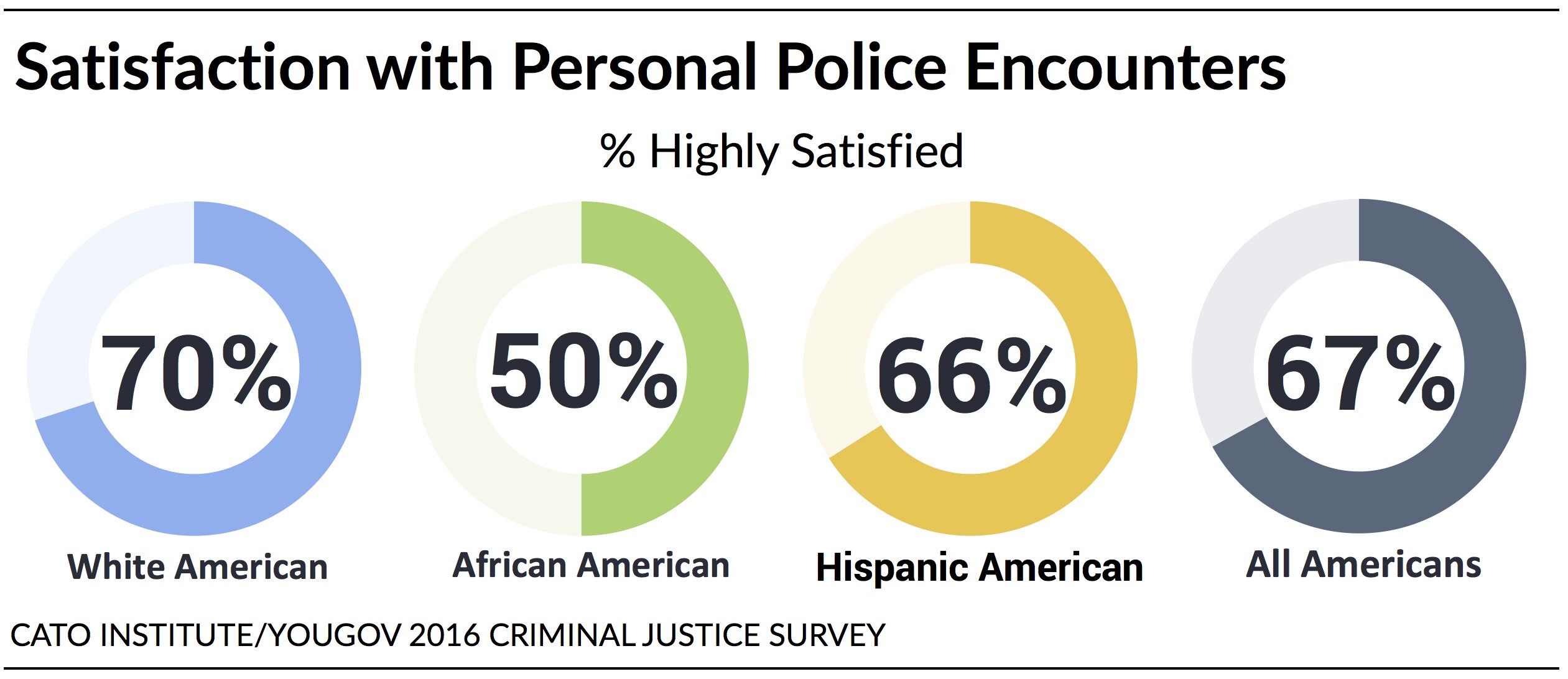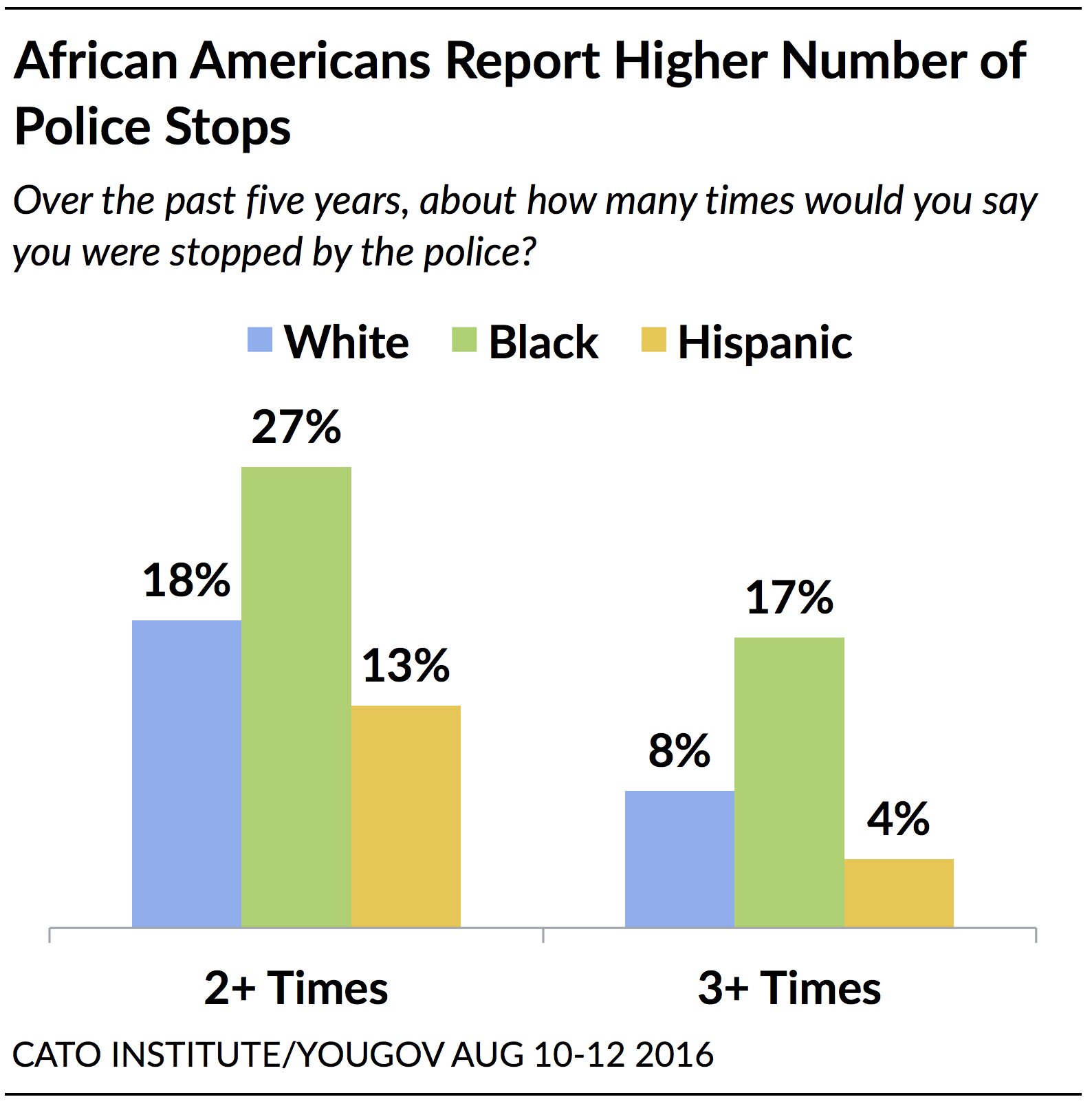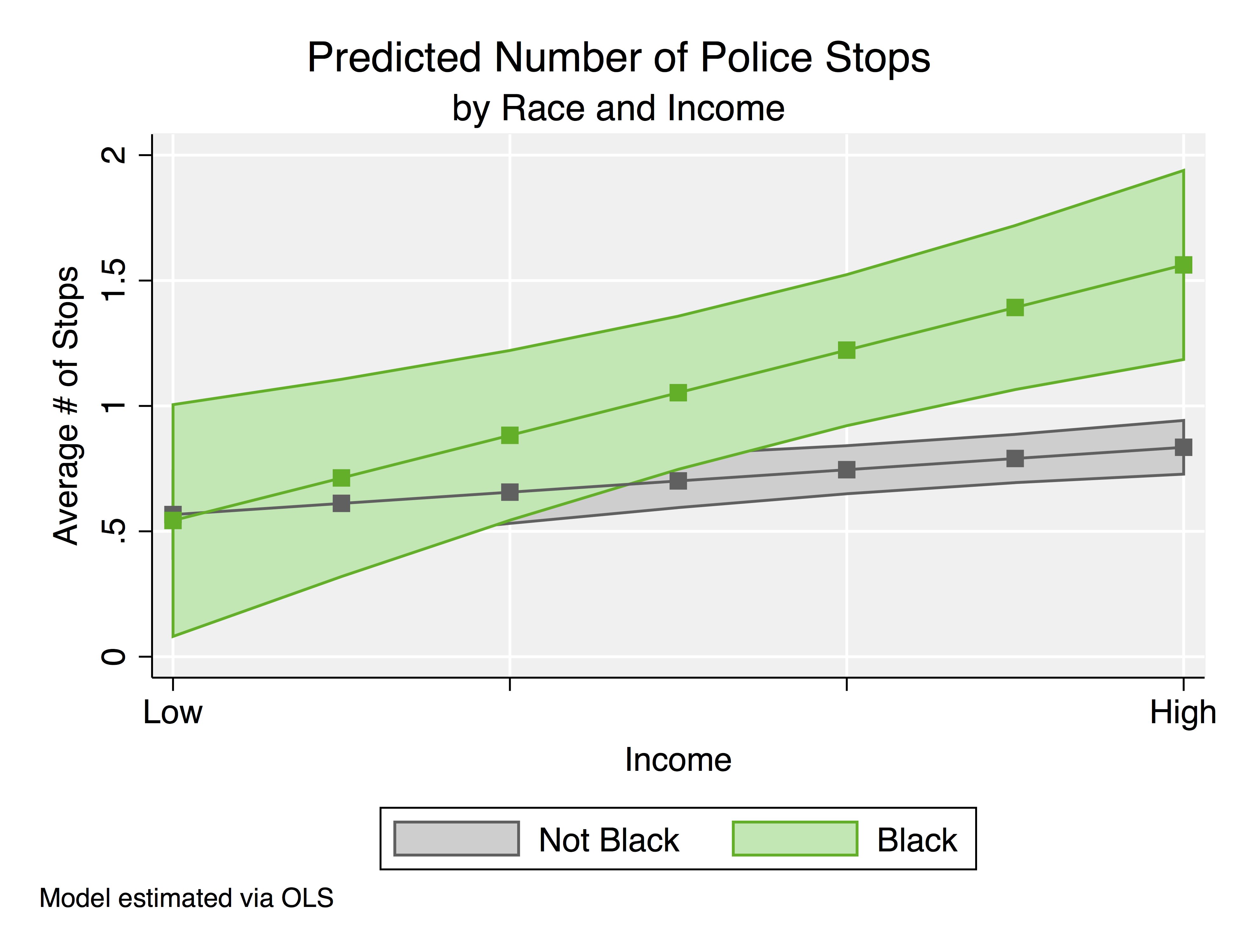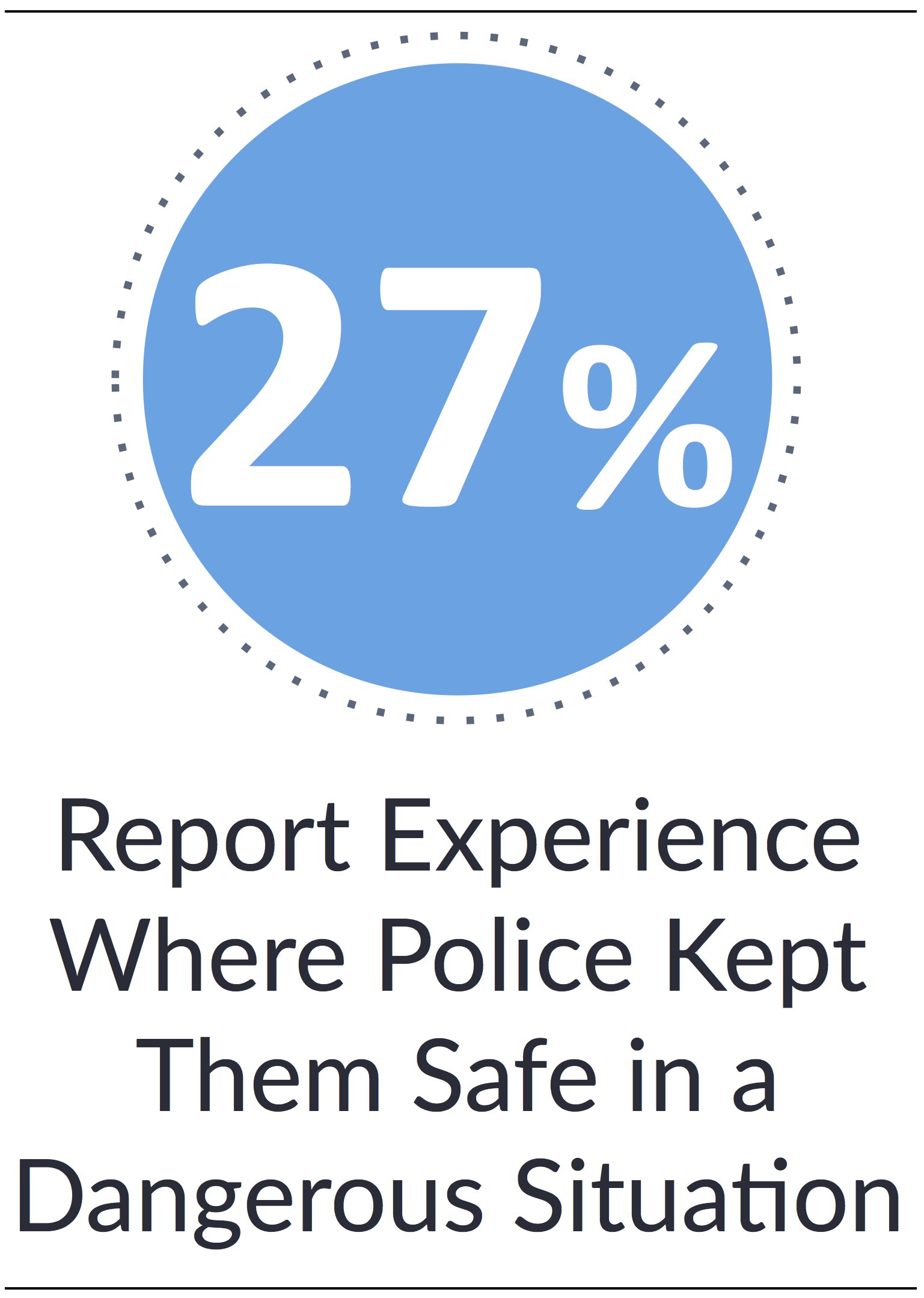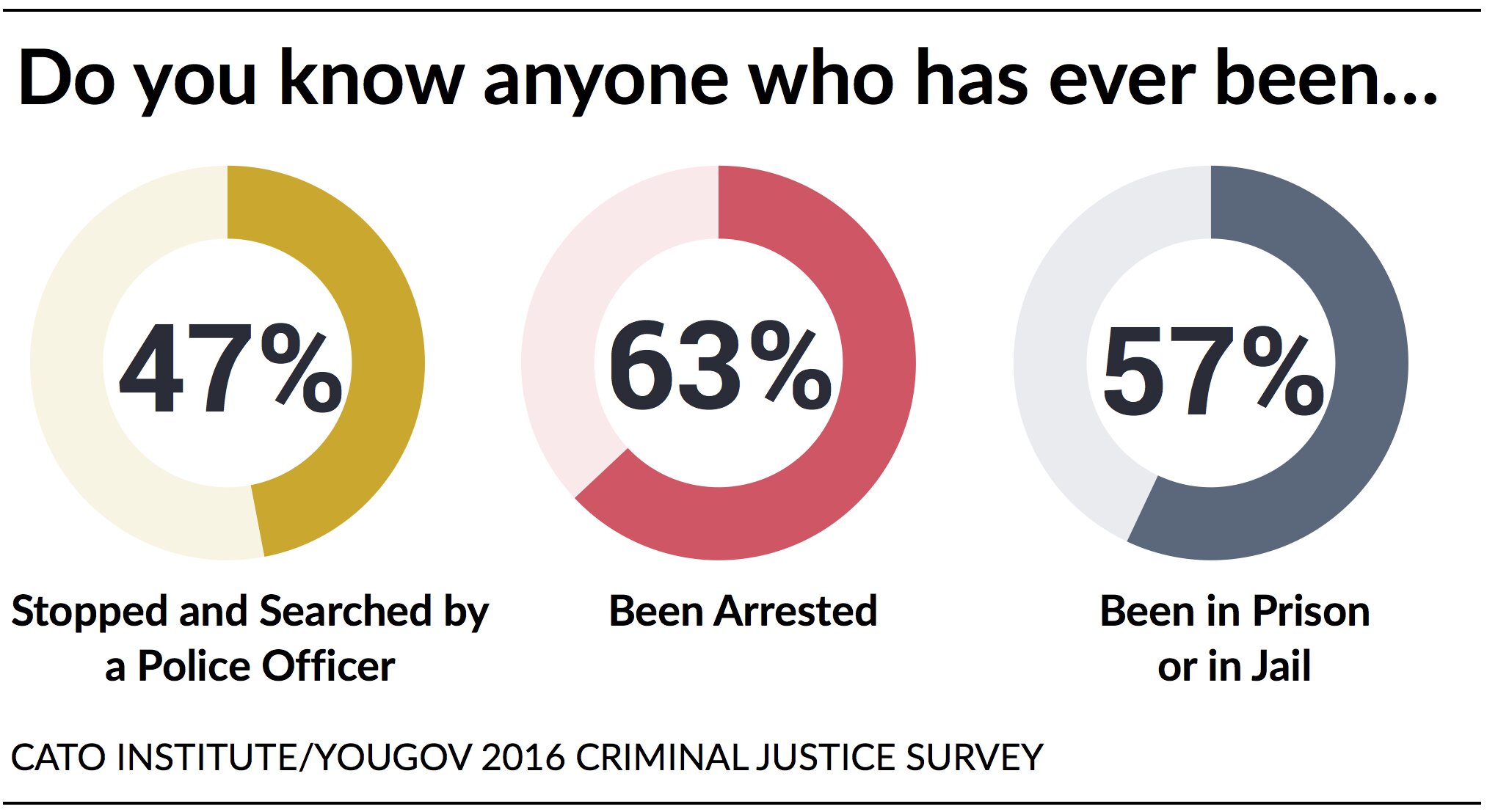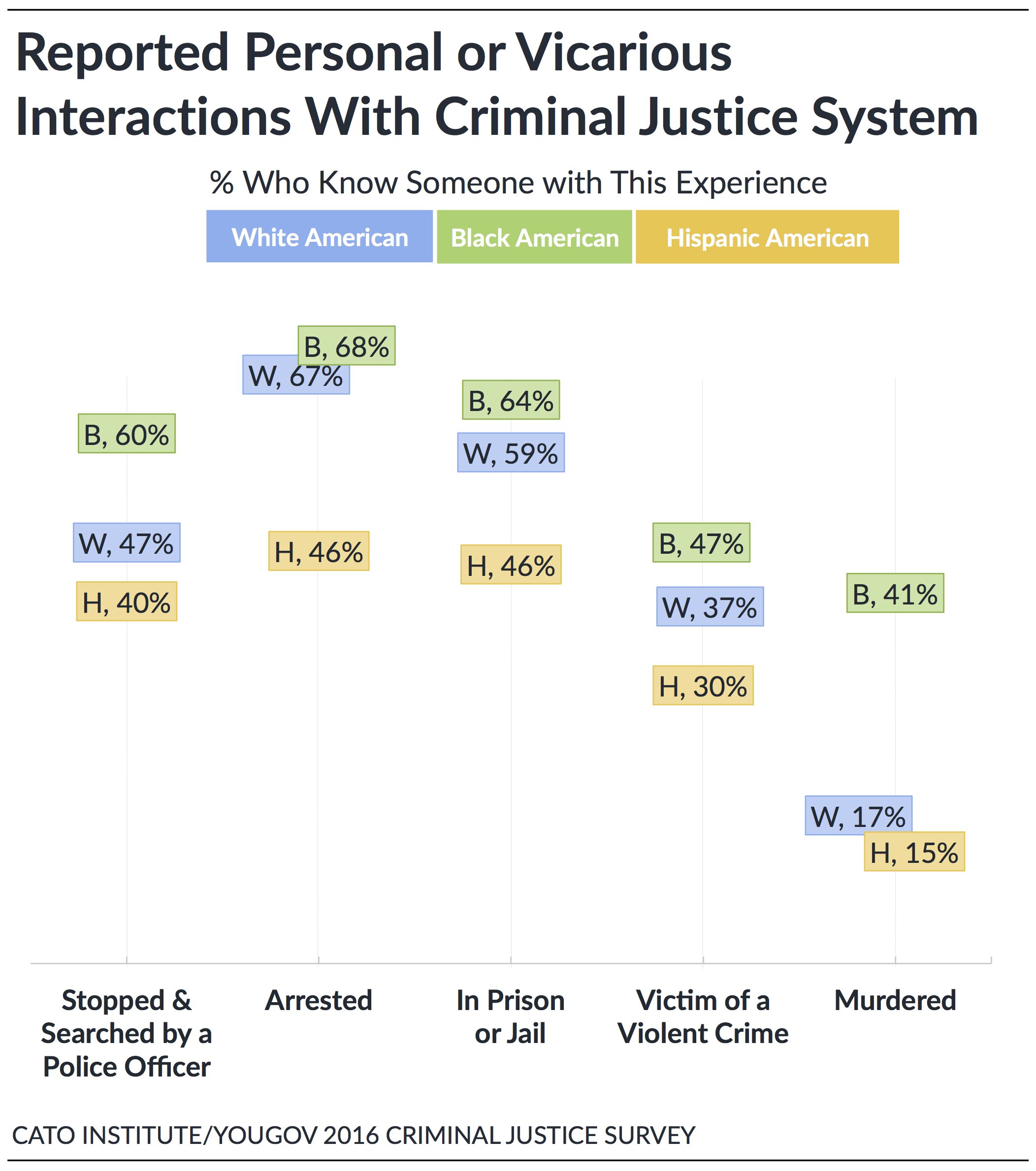Personal Contact with the Police and Justice System
Personal interactions with police officers and the criminal justice system can influence favorability toward law enforcement.25 The experiences of family members and friends may also cause a person to "vicariously experience" those interactions, thereby shaping views of the police.26 In turn, disparate personal and vicarious experiences with the police may help explain differences in favorability toward law enforcement.
Rating Personal Contact
Sixty-seven percent (67%) of Americans who have had personal contact with a police officer in the past five years report being satisfied with their encounter, rating their satisfaction as either 4 or 5 on a scale of 1 to 5.27
African Americans are considerably less likely than whites and Hispanics to positively rate their personal interactions with police officers. Seven in 10 white Americans (70%) and Hispanic Americans (66%) rate their personal police encounters as a 4 or 5, compared to 50% of African Americans who rate their personal encounters highly.
As a share of all respondents (both those with and without personal police contact in the past five years) 56% of white Americans report having had a satisfactory police encounter in the past five years, as do 38% of African Americans and 51% of Hispanics.
Partisans evaluated their interactions with the police differently. Eight in 10 Republicans report being satisfied with their police encounters over the past five years, compared to six in 10 Democrats and independents.
Not surprisingly, satisfaction with personal police contact is highly correlated with favorability toward one's local police department. Among those satisfied with personal police contact, 86% have a favorable opinion of law enforcement. But, among those dissatisfied with their interactions with police, 61% have an unfavorable opinion.
Frequency of Police Stops
Thirty-eight percent (38%) of Americans report they've been officially stopped by a police officer in the past five years: 20% say they've been stopped once, 9% say they've been stopped twice, and another 9% say they've been stopped three or more times (August 2016 survey).28
Black Americans report being stopped at a higher frequency than whites and Hispanics. Among blacks, 27% report being stopped two or more times in the past five years, as do 18% of whites and 13% of Hispanics. In a similar pattern, 17% of blacks report being stopped three or more times, compared to 8% of whites and 4% of Hispanics.
There is some evidence that black Americans are more likely to be stopped by police as their income rises than white Americans similarly situated. A statistical test finds that as blacks' incomes rise they are significantly more likely to report being stopped by police (see Appendix D).29 However, white and Hispanic Americans are no more likely to report being stopped by police as their income rises. For instance, blacks with incomes over $50,000 a year (Mean =1.34 stops) report being stopped at about 1.5 times the rate of whites with incomes over $50,000 a year (Mean =.91 stops). 30 Among those making less than $50,000 annually, blacks' average number of reported stops (Mean=.84 stops) is only slightly above whites' (Mean =.76 stops).
This fits with anecdotal reports from wealthy African Americans who report they avoid driving expensive cars to avoid added police scrutiny. For instance, actor Isaiah Washington tweeted that he sold his Mercedes and bought three less expensive Honda Priuses because he "got tired of being pulled over by the police."31 Sen. Tim Scott (R-SC) and billionaire private-equity financier Robert Smith have shared similar stories of being stopped three to seven times a year.32
Types of Personal Contact
About a quarter (27%) of Americans report having had an experience in which a police officer kept them or their family member safe in a potentially dangerous situation. Such reports do not vary considerably among demographic and political groups. As one would expect, individuals who report being kept safe (76%) are about 16 points more likely to report a favorable opinion of the police than those without this experience (60%).
Most Americans have also personally or vicariously come into contact with the police and justice system for less auspicious reasons. About half (47%) say they know someone who has been stopped and searched by an officer, 63% say they know someone who has been arrested, and 57% say they know someone who has been in prison or jail.
African Americans (60%) are 13-20 points more likely than Caucasians (47%) and Hispanic Americans (40%) to know someone who has been stopped and searched by a police officer. About two-thirds of blacks and whites say they know someone who has been arrested or been to prison or jail, compared to 47% of Hispanics.
People who report knowing someone who has been stopped and searched by a police officer are about 14 points less favorable toward the police (57%) than those who do not know someone with this experience (71%). However knowing someone who has been arrested or been to prison or jail doesn't correlate (either positively or negatively) with favorability toward the police.
Urban Density
Whether someone lives in an urban, suburban, or rural area might influence their attitudes toward the police.33 People who live in densely populated areas are more likely to come into contact with officers. City centers also are more likely to have higher crime rates, which may increase the likelihood one has an encounter with law enforcement.34 However, actual differences in favorability toward the police by community type are rather small. Sixty-nine percent (69%) of individuals living in the suburbs have a favorable view of the police, as do 60% of those living in cities and 61% residing in rural areas.
Notes:
25 Several scholarly studies find that personal satisfaction with police contact may be the strongest determinant of positive attitudes toward the police. See W. S. Wilson Huang and Michael S. Vaughn, "Support and Confidence: Public Attitudes toward the Police," in Americans View Crime and Justice: A National Public Opinion Survey, edited by Timothy J. Flanagan and Dennis R. Longmire (Thousand Oaks: Sage, 1996); Richard Scaglion and Richard G. Condon, "Determinants of Attitudes toward City Police," Criminology 17, no. 4 (1980): 485-94.
26 Ronald Weitzer and Steven A. Tuch, "Racially Biased Policing: Determinants of Citizen Perceptions," Social Forces 83 (2005): 1009-1030.
27 Americans who have had personal contact with a police officer in the past 5 years were asked to rate their level of personal satisfaction with their encounter on a scale of 1 (low satisfaction) to 5 (high satisfaction). Americans who rated their encounters as either 4 or 5 are considered "highly satisfied." Americans' average level of satisfaction with personal police encounters is 3.83, with 67% who rated their interactions with police as a 4 or 5. About a fifth of Americans say they did not interact with police over the past five years. Racial groups were about equally likely to report having had some contact with police in the past 5 years.
28 Data on frequency of police stops in this section come from a national Cato Institute/YouGov survey conducted August 10 to 12, 2016 (N=1000), which did not include oversamples of African-Americans and Hispanics. Thus, readers should exercise additional caution when interpreting these results with smaller sample sizes (African American (N=108) Hispanic (N=115)). Question wording: "Over the past five years, about how many times would you say you were stopped by the police?"
29 Model estimated via OLS regression
30 Black M=1.34 SD=1.62, white M=.91 SD=1.72.
31 Stereo Williams, "Chris Rock, Isaiah Washington, and Racial Profiling: Why Black People Shouldn't Have to 'Adapt'," Daily Beast, April 2, 2015. http://www.thedailybeast.com/articles/2015/04/02/chris-rock-isaiah-washington-and-racial-profiling-why-black-people-shouldn-t-have-to-adapt.html.
32 Sen. Tim Scott (R-SC) and Robert Smith report being pulled over between three to seven times per year. Keith L. Alexander, "'Who Is This Robert Smith?': A Quiet Billionaire Makes Some Noise with $20 Million Gift to the African American Museum." Washington Post, September 24, 2016, https://www.washingtonpost.com/national/who-is-this-robert-smith-a-quie…; Katie Reilly, "Read Senator Tim Scott's Candid Account of Getting Stopped by Police," Time, July 14, 2016, http://time.com/4406540/senator-tim-scott-speech-transcript/.
33 See W. S. Wilson Huang and Michael S. Vaughn, "Support and Confidence: Public Attitudes toward the Police," in Americans View Crime and Justice: A National Public Opinion Survey, edited by Timothy J. Flanagan and Dennis R. Longmire (Thousand Oaks: Sage, 1996).
34 Elizabeth Kneebone and Steven Raphael, "City and Suburban Crime Trends in Metropolitan America," Brookings Institutions Metropolitan Policy Program, May 2011, https://www.brookings.edu/wp-content/uploads/2016/06/0526_metropolitan_….
